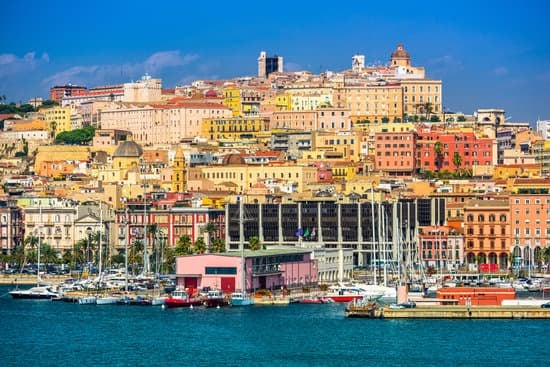Italy is a country that captivates the imagination with its rich history, stunning architecture, and delicious cuisine. For many, the idea of exploring Italy is a dream come true.
However, one common misconception that often hinders people from embarking on this adventure is the belief that speaking Italian is a prerequisite for enjoying all that Italy has to offer. In this article, we aim to dispel this notion and show you how it is indeed possible to travel through Italy without knowing the language fluently.
Italy’s allure goes beyond just its language. From the picturesque canals of Venice to the ancient ruins of Rome, there is so much to explore and appreciate in this beautiful country. While knowing Italian can certainly enhance your experience and help you immerse yourself in the local culture, it should not deter you from setting foot in this remarkable destination.
In the following sections, we will provide you with practical tips and resources that will enable you to navigate Italy confidently and comfortably even if you don’t speak Italian fluently.
We will discuss helpful tools for pre-trip preparation, offer guidance on getting around the country effortlessly, suggest ways to ensure smooth communication with Italian hotels and restaurants, highlight how you can still enjoy tourist attractions without language barriers, provide insights into engaging with locals despite the language gap, offer advice for emergency situations and staying safe in unfamiliar surroundings.
So sit back, relax, and let us take you on a journey through Italy’s charm as we debunk the myth that visiting this enchanting country requires fluency in Italian. Whether you’re planning your first trip or are a seasoned traveler looking to venture off-the-beaten-path, this article will equip you with all the information needed for an enriching experience in Italy.
Pre-trip Preparation
Traveling to Italy without knowing the Italian language may seem intimidating at first, but with the right preparation and resources, it can be a seamless and enjoyable experience. Before embarking on your Italian adventure, it is essential to equip yourself with helpful tools and resources that will assist you in navigating the country successfully.
One of the most valuable resources for non-Italian speakers is language learning apps and tools. These innovative technologies allow you to learn basic Italian phrases and vocabulary before your trip, making communication easier during your time in Italy. Some popular language learning apps include Duolingo, Babbel, and Rosetta Stone. These apps offer interactive lessons that cover essential phrases for everyday conversations, allowing you to feel more confident when interacting with locals.
In addition to language learning apps, reliable translation apps and offline dictionaries can also be incredibly useful. Apps like Google Translate or iTranslate enable you to type or speak English phrases and have them translated into Italian instantly. Furthermore, many of these apps offer an offline mode that allows you to download specific languages beforehand, ensuring that you can access translations even without an internet connection.
Another valuable resource for non-Italian speakers is online travel forums and communities. These platforms provide a space where travelers can seek advice from experienced individuals who have visited Italy before. Whether you have questions about transportation, accommodations, or local attractions, fellow travelers are often willing to share their insights and experiences. Websites like TripAdvisor or Lonely Planet’s Thorn Tree forum are excellent places to start when seeking guidance and recommendations from others who have already traveled in Italy.
By utilizing these pre-trip resources such as language learning apps, translation tools, and online travel forums, non-Italian speakers can feel more at ease as they prepare for their journey through Italy’s enchanting landscapes. With the right tools in hand before embarking on your trip abroad, exploring Italy’s charm without knowing the Italian language can be an exciting and enriching experience.
Navigating Transportation
Italy has a comprehensive public transportation system that makes it easy for non-Italian speakers to navigate the country. Whether you’re traveling by train, bus, or metro, there are several resources available to help you get around effortlessly.
One of the first things you’ll notice when using public transportation in Italy is the user-friendly ticket machines and information boards. Many of these have multilingual options, including English, which allow you to easily purchase tickets and understand important travel information. This is especially convenient for tourists who may not be familiar with the Italian language.
In addition to the ticket machines and information boards, major transportation hubs such as airports and train stations have English-speaking customer service representatives who can assist you with any inquiries or concerns. These representatives are there to ensure that travelers have a smooth experience navigating transportation in Italy.
| Transportation Mode | Number of Passengers (2019) |
|---|---|
| Train | 605 million |
| Metro/Underground | 917 million |
| Bus/Coach | 1.25 billion |
As seen in the table above, millions of passengers utilize trains, metros/undergrounds, and buses/coaches as their preferred mode of transportation in Italy each year. This further emphasizes the effectiveness and efficiency of the country’s public transportation system.
Overall, whether you are exploring bustling cities like Rome or venturing into charming countryside towns, getting around Italy without knowing Italian is entirely possible. With a well-organized public transportation system, user-friendly ticket machines, and English-speaking assistance available, travelers can navigate Italy’s transportation network effortlessly.
Accommodations
When traveling to Italy without knowing the language, one of the important aspects to consider is ensuring smooth communication with the hotels you’ll be staying in. Booking hotels with English-speaking staff is a great way to alleviate any potential language barriers, as they can provide assistance and answer any questions you may have during your stay.
Booking hotels with English-speaking staff
Before making your hotel reservations, it’s recommended to check if the hotel has English-speaking staff. Many hotels in popular tourist destinations in Italy cater to international travelers and have staff members who are fluent in English. This can be easily identified on hotel websites or through travel booking platforms by looking for phrases such as “English spoken” or “English-speaking staff.” Choosing accommodation establishments that prioritize clear communication in multiple languages will greatly enhance your travel experience.
Common English phrases for hotel interactions
While staying at a hotel in Italy, even if the staff speaks English, it’s useful to have a few common English phrases related to hotel interactions. These phrases will help you navigate check-ins, room preferences, and any additional requests you may have. Here are some essential expressions:
- “I have a reservation.” (Ho una prenotazione).
– “Can I check-in now?” (Posso fare il check-in adesso?)
– “Is breakfast included?” (È incluso la colazione?)
– “What time is check-out?” (A che ora è il check-out?)
– “Could I get some extra towels, please?” (Potrei avere degli asciugamani extra, per favore?)
Knowing these simple phrases will make your interactions with hotel staff more efficient and ensure that your needs are met smoothly throughout your stay.
Tips for clarifying specific requirements or preferences
In addition to basic communication needs, it’s essential to communicate any specific requirements or preferences you may have to the hotel staff. This can include requests for a specific room type, accessibility needs, or any allergies or dietary restrictions. While language barriers may exist, here are a few tips to ensure that your requests are clearly understood:
- Use simple and straightforward language.
- Utilize translation apps or offline dictionaries to show written translations if necessary.
- Use visual aids such as pictures or symbols if possible.
By taking these steps, you can effectively communicate your needs and preferences with hotel staff, ensuring a comfortable and enjoyable stay in Italy even without fluency in Italian.
Ordering Meals
Italy is renowned for its delicious cuisine, and it would be a shame to miss out on the country’s culinary delights just because you don’t speak Italian. Thankfully, there are several ways to confidently navigate restaurants and order meals without fluent language skills.
Understanding Italian restaurant menus can be intimidating, but there are a few strategies that can make the process much easier. Many Italian menus will have English translations alongside the Italian descriptions, especially in tourist-heavy areas. Even if this isn’t the case, you can still navigate the menu by recognizing common dish names or ingredients.
Familiarize yourself with basic Italian food vocabulary such as “pasta,” “pizza,” “risotto,” “gelato,” and “panna cotta.” This will help you identify dishes and make informed choices.
When it comes to placing your order, there are a few key phrases that can come in handy. Learn how to say “I would like” (“vorrei”) followed by the name of the dish or drink you want. For example, if you want to order a pizza margherita, you could say “Vorrei una pizza margherita.”
It’s also helpful to know how to ask for recommendations (“Cosa mi consiglia?”) or ask about ingredients (“Quali sono gli ingredienti?”). Remember that Italians value their food culture and appreciate when visitors show an interest in trying local dishes.
Communication is crucial when it comes to dietary restrictions or preferences. If you have any special dietary requirements, such as being vegetarian or having allergies, it’s important to communicate them clearly. Research basic phrases related to your dietary needs and inform your server before ordering. For instance, if you are allergic to seafood, learn how to say “I am allergic to seafood” (“Sono allergico/a ai frutti di mare”) so that your server can provide suitable options.
| Italian | English |
|---|---|
| Vorrei | I would like |
| Cosa mi consiglia? | What do you recommend? |
| Quali sono gli ingredienti? | What are the ingredients? |
| Sono allergico/a ai frutti di mare. | I am allergic to seafood. |
With a little preparation and some basic Italian phrases under your belt, you can confidently savor Italy’s culinary delights without knowing the language. Don’t be afraid to step out of your comfort zone and try new dishes – it’s all part of the adventure. Remember that many restaurant staff members in popular tourist areas will have at least a basic understanding of English, so don’t hesitate to ask for assistance or clarification if needed.
Exploring Tourist Attractions
When visiting Italy, one of the most exciting aspects is exploring its renowned tourist attractions. Luckily, language barriers should not deter non-Italian speakers from fully immersing themselves in Italy’s rich cultural heritage. With proper planning and some helpful tips, travelers can enjoy all that this beautiful country has to offer without fluency in Italian.
One way to navigate tourist attractions without language barriers is by taking advantage of guided tours and audio guides. Many popular attractions, such as the Colosseum in Rome or the Vatican Museums, offer guided tours in various languages. This allows visitors to learn about the history and significance of these places without relying on their own language skills. Additionally, audio guides are often available for rent or included in admission tickets, providing detailed information in multiple languages.
English-speaking staff at major attractions are also invaluable resources for non-Italian speakers. While not every staff member may speak English fluently, it is common to find employees who have a basic understanding of English and can provide assistance or answer questions. It is worthwhile to seek out these individuals when needed and utilize their expertise.
Furthermore, visual cues and maps can be incredibly helpful when exploring tourist attractions. Many sites have clear signage and directions in both Italian and English, making it easier for visitors to navigate their way around. Additionally, studying maps beforehand or using map apps specifically designed for tourists can enhance the experience by providing a better understanding of the layout and location of different points of interest.
Overall, with guided tours, helpful staff members, visual cues, and maps, tourists can fully immerse themselves in Italy’s richness regardless of their language abilities.
Local Interactions
Engaging with locals is an essential part of any travel experience, as it allows us to learn about their culture, traditions, and way of life. While language barriers may initially seem daunting, it is entirely possible to engage with Italians and have meaningful interactions without fluent Italian skills. By utilizing genuine gestures, key phrases, and cultural etiquette, travelers can foster positive connections during their time in Italy.
Genuine Gestures and Body Language
When language fails as a means of communication, body language and genuine gestures can bridge the gap between individuals. Italians are known for their expressiveness, so embracing hand movements and facial expressions can help convey your message effectively. Simple gestures such as smiling, nodding, or using thumbs up can go a long way in expressing friendliness and understanding. It’s important to remember that different cultures have varying interpretations of certain gestures, so being aware of cultural differences is crucial.
Key Phrases for Basic Conversations
While fluency in Italian may not be necessary for basic conversations, learning a few key phrases can greatly enhance your interactions with Italians. Basic greetings such as “Buongiorno” (good day) or “Buonasera” (good evening) are always appreciated when entering a shop or restaurant. Expressions like “Grazie” (thank you) and “Prego” (you’re welcome) will also come in handy during your travels.
Additionally, learning how to politely ask for directions or recommendations using phrases like “Mi scusi, dove si trova ?” (Excuse me, where is ?) can ensure smoother navigation around the country.
Cultural Etiquette
Understanding and respecting cultural etiquette is vital when engaging with locals in Italy. Italians value politeness and respect in their interactions, so adopting certain behaviors can lead to more positive experiences. For example, it is customary to greet people with a firm handshake and maintain eye contact when engaging in conversation.
Additionally, it is considered impolite to interrupt or speak loudly. Taking the time to learn about Italian customs and traditions can not only enhance your interactions but also show respect for the local culture.
By embracing genuine gestures, using key phrases, and respecting cultural customs, travelers can engage with Italians despite the language barrier. These small efforts can lead to meaningful connections and a deeper understanding of Italian culture. It’s important to approach these interactions with an open mind and a willingness to learn, as this will enrich your travel experience and foster memorable moments during your time in Italy.
Emergency Situations
In any travel experience, it is essential to be prepared for unexpected situations, especially when it comes to emergencies. While traveling in Italy without knowing Italian may seem daunting, there are ways to ensure your safety and receive assistance when needed.
One of the first steps in staying safe during your trip is familiarizing yourself with emergency numbers and locating nearby hospitals. In Italy, the general emergency number is 112, which can be dialed for police, medical assistance, or the fire department. It is important to have these numbers readily available on your phone or in a written form so that you can access them quickly in case of an emergency.
In emergency situations, finding someone who speaks English may be crucial. Fortunately, many emergency operators in Italy are trained to speak English and other major languages as well. When dialing the emergency number, try to clearly articulate your situation and provide as much detail as possible. If language becomes a barrier during the call, using translation apps can help bridge the communication gap.
Furthermore, if you find yourself needing medical attention or experiencing a non-life-threatening emergency, you can typically locate hospitals by looking for signs that say “ospedale” or “pronto soccorso,” which means emergency room. These facilities usually have staff members who speak English and can assist with your needs.
While it is important to take precautions and be prepared for emergencies during your trip to Italy even without fluent Italian skills, remember that you don’t have to navigate these situations alone. Seek assistance from locals or fellow travelers whenever necessary; their willingness to help often transcends language barriers. By being aware of the resources available and staying calm during emergencies, you will be able to handle unexpected circumstances effectively and ensure your safety throughout your journey in Italy.
Conclusion
In conclusion, exploring Italy without knowing Italian is absolutely possible and can lead to an incredibly enriching experience. As highlighted in this article, there are numerous resources available to assist non-Italian speakers in navigating the country’s charms. From language learning apps to translation tools and online travel communities, travelers have access to a wealth of information that can help them communicate effectively and confidently during their trip.
Italy’s public transportation system also proves to be readily accessible for non-Italian speakers. With user-friendly ticket machines and information boards, getting around the country is made effortless. Additionally, English-speaking customer service at major transportation hubs ensures that any questions or concerns can be addressed promptly and accurately.
When it comes to accommodations and dining, choosing hotels with English-speaking staff and familiarizing oneself with basic phrases allows for smooth communication. Ordering meals becomes an enjoyable experience with a basic understanding of Italian food vocabulary and the ability to communicate dietary restrictions and preferences effectively. Moreover, guided tours, audio guides in multiple languages, and English-speaking staff at tourist attractions contribute to an immersive exploration of Italy’s richness.
Engaging with locals may seem daunting without knowledge of Italian; however, genuine gestures and body language can convey friendliness while key phrases for greetings and basic conversations demonstrate respect for the culture. Lastly, knowing how to handle emergency situations by locating hospitals and using translation apps ensures safety and peace of mind throughout the journey.
In essence, while fluency in Italian certainly enhances the travel experience, it is not a prerequisite for savoring all that Italy has to offer. With adequate preparation, awareness of available resources, and a willingness to embrace cultural differences, one can unlock Italy’s splendor beyond language barriers. So pack your bags, embark on this adventure with confidence, and allow yourself to be captivated by Italy’s beauty.
Frequently Asked Questions
Are tourists allowed to speak English in Italy?
Yes, tourists are allowed to speak English in Italy. English is commonly understood and spoken, especially in tourist areas and major cities like Rome, Florence, and Venice.
Many Italians working in the tourism industry can communicate in English as well. While it is always appreciated to make an effort to learn some basic Italian phrases as a sign of respect for the local culture, speaking English should not pose significant challenges for tourists visiting Italy.
Is it important to know Italian in Italy?
Knowing Italian is certainly important when visiting Italy. While many Italians do speak or understand English, particularly younger generations and those working in tourism-related fields, knowing the local language can greatly enhance your experience in the country.
It allows you to fully immerse yourself in the culture, communicate with locals on a deeper level, and navigate day-to-day activities more independently. Additionally, speaking even just a few basic phrases in Italian shows respect for the local customs and often elicits a more positive response from Italians.
Can you get by in Rome with no Italian?
It is possible to get by in Rome with no Italian, especially if you stick to highly touristic areas where English is more commonly spoken. Many hotels, restaurants, shops, and attractions catering to tourists will have staff members who can communicate in English. Additionally, public transportation signs and information are often available in multiple languages including English.
However, venturing into more local neighborhoods or non-touristy areas may pose challenges without any knowledge of Italian as fewer people may speak English there. Therefore, while it’s possible to navigate Rome without Italian language skills as a tourist, learning some basic phrases can significantly enhance your experience and ease interactions with locals beyond the main tourist hotspots.

I’m a passionate traveler, writer, and Italophile. My fascination with Italy’s history, art, and culture has led me on countless adventures across the Italian landscape. Through “I Live Italy,” I share my love for this extraordinary country and aims to inspire others to explore its boundless beauty.





